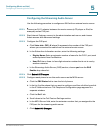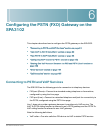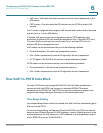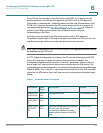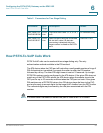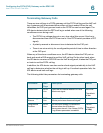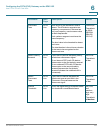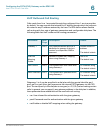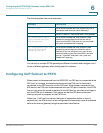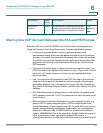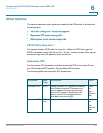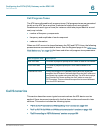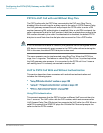
Configuring the PSTN (FXO) Gateway on the SPA3102
How PSTN-To-VoIP Calls Work
ATA Administration Guide 99
6
Terminating Gateway Calls
There are two call legs in a PSTN gateway call: the PSTN call leg and the VoIP call
leg. A gateway call is terminated when either call leg is ended. When the call
terminates, the FXO port goes on-hook so the PSTN line can be used again. The
ATA device detects that the PSTN call leg is ended when one of the following
conditions occurs during a call:
• The PSTN Line voltage drops to a very low value (this occurs if the line is
disconnected from the PSTN service or if the PSTN switch provides a CPC
signal).
• A polarity reversal or disconnect tone is detected at the FXO port.
• There is no voice activity for a configurable period of time in either direction
at the FXO port.
When any of the above conditions occur, the ATA device takes the FXO port on
hook and sends a BYE request to end the VoIP call leg. On the other hand, when
the ATA device receives a SIP BYE from the VoIP during a call, it takes the FXO port
on hook to end the PSTN call leg.
In addition, the ATA device can also send a refresh signal periodically to the VoIP
call leg to determine whether the call leg is still up. If a refresh operation fails, the
ATA device ends both call legs.
The following table lists parameters for terminating gateway calls.
Parameter Web
Page
Description Values
Detect CPC PSTN
Line
If yes, the ATA device detects CPC as a
disconnect signal.
Yes or No
The default
is Yes.
Detect Long
Silence
PSTN
Line
If yes, the ATA device detects prolonged
silence period as a disconnect signal.
Yes or No
Long Silence
Duration:
PSTN
Line
The minimum duration of continuous
silence before the ATA device
disconnects the call, if the
Detect (PSTN)
Long Silence
parameter is enabled.
10-255
The default
is 30(s).




